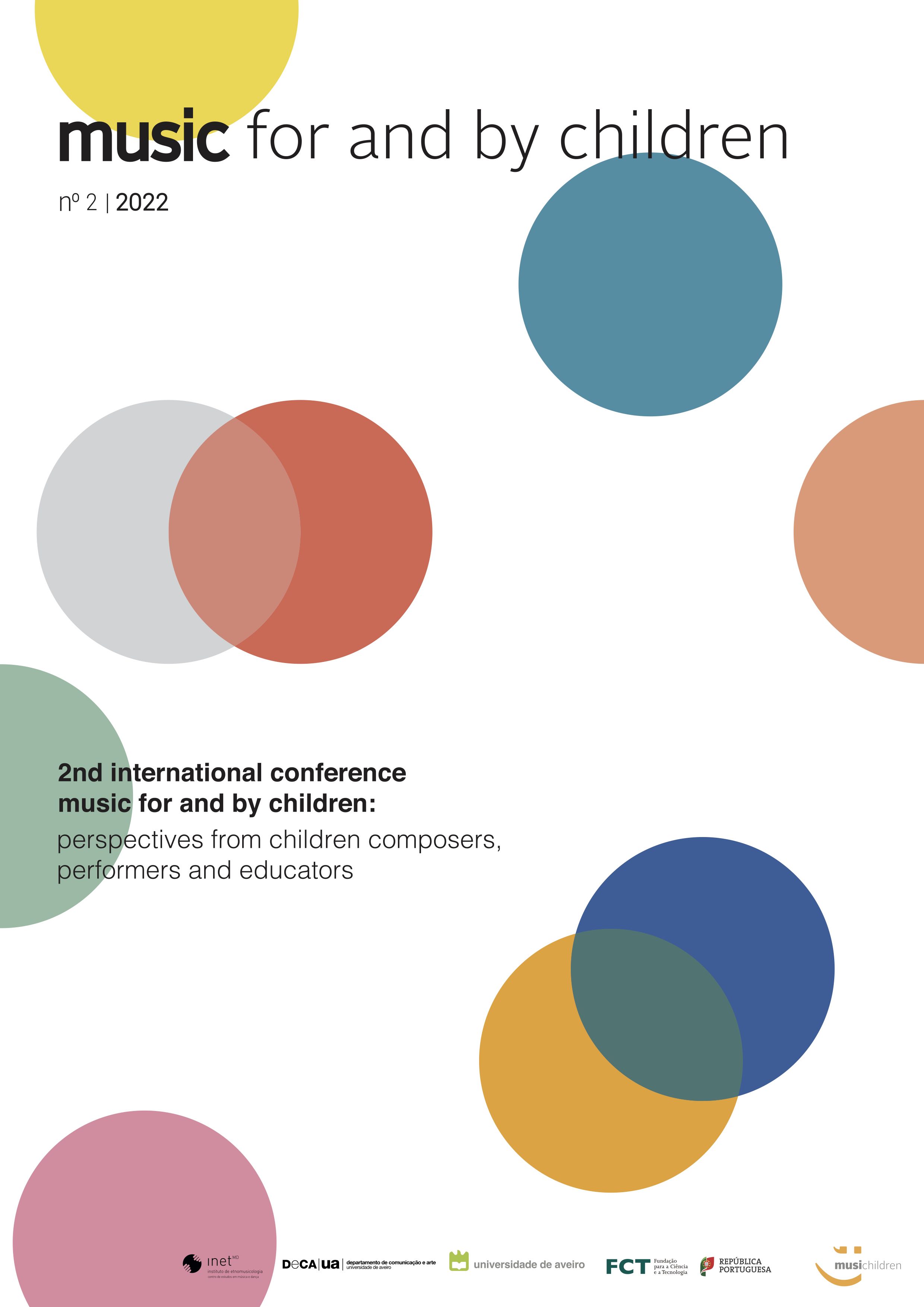Problem-based Learning
Composing in the classroom as a challenge for learning music
Abstract
The challenges posed by contemporary society have amplified the issue of learning by placing it at the center of educational and political discourses. The development of autonomy, critical and creative thinking, research and cooperation skills, curiosity, learning to learn, all connected with debates born in the cognitive and sociocognitive psychology of Piaget, Bruner, Vigotsky and Bandura and in the ideas of the active school promoted by Dewey, not only configures guiding principles of curricular and ministerial discourses (e.g. aprendizagens essenciais), but also requires alternative and complementary models to the expositive, imitative and direct instruction. Problem-based Learning (PBL) is one of the possible paths. Although its study brings together scientific literature, the application to music education is far from being consolidated, particularly regarding the reflection, design and empirical treatment of action plans in line both with curricular purposes and ideals. Here, we propose possibilities to learn music by creating and composing, a path which, following the thoughts of authors such as Burnard, Hickey, Paynter, Priest, Webster and Wiggins, seems to meet the challenges of that model. In parallel with definitions and characteristics, the text presents the PBL as an organizer of the educational action, having in mind the analyses in the context of music. The specific objectives are the contribution to clarify the subject, including the relevance and justification of the proposal around the conception of a music learning model based on problems arising from didactic drawings elaborated from processes of composing; upgrade and substantiate, theoretically and empirically, the PBL educational model, highlighting the relationship and relevance between their assumptions and the research design carried out by the authors and integrated in the Portuguese secondary school. The text presents a bibliographical review on PBL, defining key concepts and highlighting publications of scientific, theoretical and empirical nature, general and musical, as well as portuguese ministerial documents. The information collected was organized into categories of analysis which constituted the architecture of the text. Sustaining the composition as a path of intervention which identifies itself with the model described, born from formulations developed in the classroom, was consolidated by the study of authors such as those above-mentioned. Descriptions on PBL definition and characteristics stand out, as well as learning process contemplating collaborative work and the teacher as a facilitator, and, less assertively, effects on knowledge acquisition. Empirical evidence falls upon long-term memory and social interaction gains, as well constraints focusing on the initial adaptation of teachers and students, time management, individual and group evaluation, definition of problems, their relationship with previous concepts, suggesting the need of further investigation. Regarding music education by composing, related ideas about thinking in sound, audiation, divergent and creative thinking, focus on the student, collaborative work, subjects inherent to challenge based learning, also are highlighted.
References
Blackwell, J. & Roseth, N. (2018). Problem-Based Learning in a Woodwind Methods Course: An Action Research Study. Journal of Music Teacher Education, 28(1), 55-69.
Bruner, J. (1960). The process of education. Cambridge, MA: Harvard University Press.
Burnard, P. & Younker, B. (2004). Problem-solving and creativity: insights from students’ individual composing pathways. International Journal of Music Education, 22(1), 59-76.
Caspurro, H. (2015). Improvisação e composição como estratégias de resolução de problemas em sala de aula e promoção do pensamento criativo. Sebenta de apoio às aulas de Didática da Música (Documento não publicado).
Dewey, J. (1976). Experiência e Educação. São Paulo: Companhia Editora Nacional.
Filipenko, M. & Naslund, J. (2016) (eds). Problem-based Learning in Teacher Education. New York: Springer.
Girdzijauskienė, R. (2018). From the idea to the final result: the process of pupils’ musical creation. Musichildren Proceedings of the 1st International Conference Music for and by children, 168-177.
Hickey, M. (2012). Music Outside the Lines: Ideas for Composing in K-12 Music Classrooms. Oxford: Oxford University Press.
Jonassen, D. (2011). Supporting Problem Solving in PBL. Interdisciplinary Journal of Problem-Based Learning, 5(2), 95-119.
Laprise, R. (2018). What’s the Problem? Exploring the Potential of Problem-Based Learning in an Ensemble Setting. Music Educators Journal, 104(4), 48-53. Retrieved from
https://journals.sagepub.com/doi/10.1177/0027432118754636
Ministério da Educação (2017). Perfil dos Alunos à Saída da Escolaridade Obrigatória. Lisboa: Ministério da Educação/Direção-Geral da Educação (DGE).
Moallem, M., Hung, W., & Dabbagh, N. (2019) (eds). The Wiley Handbook of Problem-based Learning. Boston: Wiley-Blackwell.
Paynter, J. & Aston, P. (1970). Sound and Silence. Classroom projects in creative music. Cambridge: CUP.
Pellizon, L. & Beineke, V. (2019). Criatividade e práticas criativas em educação musical: um estudo das produções recentes nos anais de congressos da Abem. Revista da Abem, 27(42), 8-35.
Piaget, J. (1963). The Psychology of Intelligence. Totowa, New Jersey: Littlefield Adams.
Priest, T. (2002). Creative Thinking In Instrumental Classes. Music Educators Journal, 88(4), 47-53.
Shaffer, K. (2014). Part 3: Assessing Problem-based Learning. Engaging Students: Essays in Music Pedagogy, 2.
Vasconcelos, M. J., Caspurro, H. & Costa, N. (2016). Experiências de Aprendizagem Musical Baseadas na Resolução de Problemas: Um Estudo Exploratório em Sala de Aula. Revista Portuguesa de Educação Artística, 6(2), 21-36.
Vygotsky, L. S. (1978). Mind in Society. Cambridge, MA: Harvard University Press.
Webster, P. (2009). Children as Creative Thinkers in Music: Focus on Composition. L. Hallam, I. Cross & M. Thaut (Eds.) The Oxford Handbook of Music Psychology, 421-428. Oxford, UK: Oxford University Press.
Webster, P. (2018). Rethinking Music Education: Encouraging Creative Thinking in Sound Across all Musical Experiences. International Society for Music Education.
Wiggins, J. (2001). Teaching for Musical Understanding. Boston: McGraw Hill.
Yang, H. (2014). Teaching Music History at Hong Kong Baptist University: Problem-Based Learning and Outcome-Based Teaching and Learning. Journal of Music History Pedagogy, 4(2), 329-332.
Copyright (c) 2023 Music for and by children

This work is licensed under a Creative Commons Attribution 4.0 International License.





